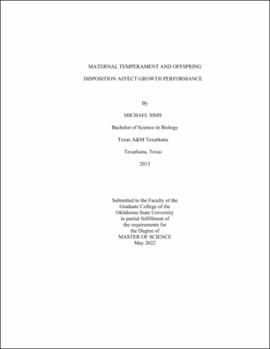| dc.contributor.advisor | Beck, Paul | |
| dc.contributor.author | Sims, Michael | |
| dc.date.accessioned | 2023-04-03T20:51:39Z | |
| dc.date.available | 2023-04-03T20:51:39Z | |
| dc.date.issued | 2022-05 | |
| dc.identifier.uri | https://hdl.handle.net/11244/337236 | |
| dc.description.abstract | Cattle temperament has been described as the level of fearfulness toward humans or a novel environment. Cattle with an undesirable temperament may have increased aggression toward handlers, poor reproductive success, and reduced carcass quality. Our objectives were to observe maternal temperament during calving and subsequent influence on offspring disposition at weaning and effects on growth performance and carcass value. Maternal behaviors at calving were observed from cow herds kept at four locations within the University of Arkansas system. Cows were assigned a maternal disposition score (MDS) at calving. Calves were then observed at weaning and assigned a chute score (CS). Both scoring techniques were based on previously established scoring systems. Data were analyzed using GLIMMIX procedures of SAS (α = 0.05). The animal was the experimental unit but blocked by location for all dependent variables. Location, sex, diet, dam age, and MDS were included in the class as covariables for all finishing growth performance and carcass data related to CS. A Pearson correlation was generated to evaluate the relationship between the two scoring systems. No correlation was observed between MDS and CS (P = 0.22). Cows that were more aggressive at calving birthed heavier calves (P < 0.01) than indifferent cows. Maternal disposition score had an effect on feedlot receiving weight. Calves born to cows with MDS of 2 or 3 (very aggressive or very attentive, respectively) were heavier (P = 0.03) upon arrival at the feedlot than those from cows with MDS of 4 or 5 (indifferent or apathetic, respectively). Calves with CS of 3 (nervous) were heavier (P < 0.01) at weaning than those with CS of 1 (docile). Restless calves were heavier than nervous calves at the end of the finishing phase. Also, calves that were docile at weaning had greater marbling than calves that were restless, but calves that were restless at weaning had greater lean muscle area than those that were nervous. Our findings suggest that calves with a midrange temperament may have greater growth potential throughout their lives. | |
| dc.format | application/pdf | |
| dc.language | en_US | |
| dc.rights | Copyright is held by the author who has granted the Oklahoma State University Library the non-exclusive right to share this material in its institutional repository. Contact Digital Library Services at lib-dls@okstate.edu or 405-744-9161 for the permission policy on the use, reproduction or distribution of this material. | |
| dc.title | Maternal temperament and offspring disposition affect growth performance | |
| dc.contributor.committeeMember | Salak-Johnson, Janeen | |
| dc.contributor.committeeMember | Foote, Andrew | |
| osu.filename | Sims_okstate_0664M_17618.pdf | |
| osu.accesstype | Open Access | |
| dc.type.genre | Thesis | |
| dc.type.material | Text | |
| dc.subject.keywords | animal welfare | |
| dc.subject.keywords | chute score | |
| dc.subject.keywords | temperament | |
| thesis.degree.discipline | Animal Science | |
| thesis.degree.grantor | Oklahoma State University | |
